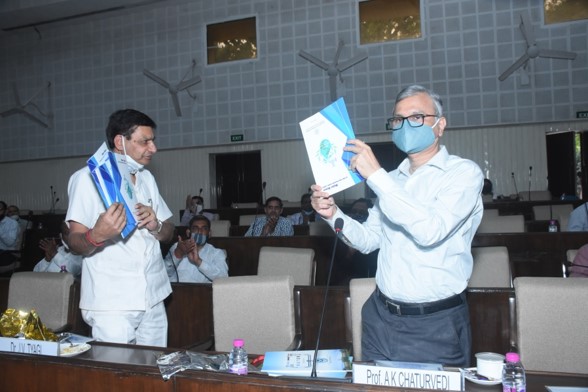IIT Roorkee organised World Water Day in collaboration with the National Institute of Hydrology
Roorkee: Indian Institute of Technology (IIT) Roorkee commemorated World Water Day in collaboration with the National Institute of Hydrology (NIH) that witnessed enthusiastic participation from delegates. The event was organised by the Department of Hydro and Renewable Energy (HRED) of IIT Roorkee in the hybrid mode with 40 offline participants, including faculty of the institute and scientists from NIH and more than 60 online participants. With ‘Valuing Water’ as the theme, the event witnessed the release of the publication of HRED titled ‘Water Reuse: A vital step Towards Water Value’ authored by Ms. Kirti Goel and Prof. Arun Kumar HRED. The 60-minute-long event was graced by the directors of IIT Roorkee and NIH, along with several faculty members, scientists, staff, and students from different departments of IIT and NIH.
Another highlight was the keynote session delivered by Dr. Gwyn Rees, Head of Water Resources, UK Centre for Ecology & Hydrology, on Sustainable Catchment Management (SCM) to ensure judicious use of water. The session explored various approaches for SCM to protect freshwater resources.
“Sustainable water management has a multiplier effect in reducing water treatment costs for public water supply, minimising pollution, increasing the utility of water and protecting biodiversity. All of these outcomes have economic and social benefits in Natural Capital Accounting and maintaining a harmonious balance with Nature” Dr. Gwyn Rees, Head of Water Resources, UK Centre for Ecology & Hydrology
Dr. Gwyn Rees is a senior research manager possessing over 30 years of experience in applied hydrology, specialising in low flows, droughts, water resources, and climate change impacts. His earliest collaboration with NIH and IIT-Roorkee dates back to 1995. Gwyn provides strategic leadership of UKCEH’s water resources research in his current role, directing a portfolio of some 60 projects and having line management responsibility for some 70 staff. His research areas cover a wide range of freshwater science, including hydrological data collection and management, hydrological modeling & water resources assessments, drought monitoring & prediction, seasonal forecasting, climate impact studies, and water quality & freshwater ecosystems monitoring, modelling & management. He is Programme Lead for CEH’s £13M, 5-year “Sustainable Use of Natural Resources to Improve Human Health and Support Economic Development” (SUNRISE) programme, focusing on South Asia, South East Asia and Sub-Saharan Africa. He was Principal Investigator for the recently completed Newton-Bhabha project, “Upscaling Catchment Processes for Sustainable Water Management in Peninsular India” (UPSCALE). Amongst his many roles, Gwyn is a member of the CIWEM Water Resources Panel and an Advisory Committee member of the WMO-GWP Integrated Drought Management Programme.
“Water is an indispensable resource for our planet. Lack of access to clean water is a formidable challenge for India. Prudent management of water is the key to environmental sustainability. Academic and research institutions should undertake intensive research in the field to make this planet habitable for generations to come” Prof. Ajit K. Chaturvedi, Director, IIT Roorkee
Dr. Sudhir Kumar elaborated on the contribution of NIH in the sectors of hydrology and water. It was followed by the presentations from Prof. MK Jain, Head, Department of Hydrology, IIT Roorkee, Prof. Ashish Pandey, Head, Water Resources Development and Management (WDM), Prof. Z Ahmad, Civil Engineering Department, IIT Roorkee, Prof. AS Maurya, Design Innovation Centre, IIT Roorkee and Prof. SK Singal, Head, HRED about the water-related R&D activities and initiatives taken by respective departments.
The event was conducted by Prof. Sonal K. Thengane, HRED, under the supervision of Prof. SK Singal.
World Water Day, held on 22 March every year since 1993, focuses on the importance of freshwater. World Water Day aims to highlight water’s significance, raise awareness, and drive affirmative action on water efficiency and conservation. Currently, about 2.2 billion people are living without access to safe water. It is about taking action to tackle the global water crisis. World Water Day’s core focus is to support the achievement of Sustainable Development Goal 6: Water and Sanitation for all by 2030.

